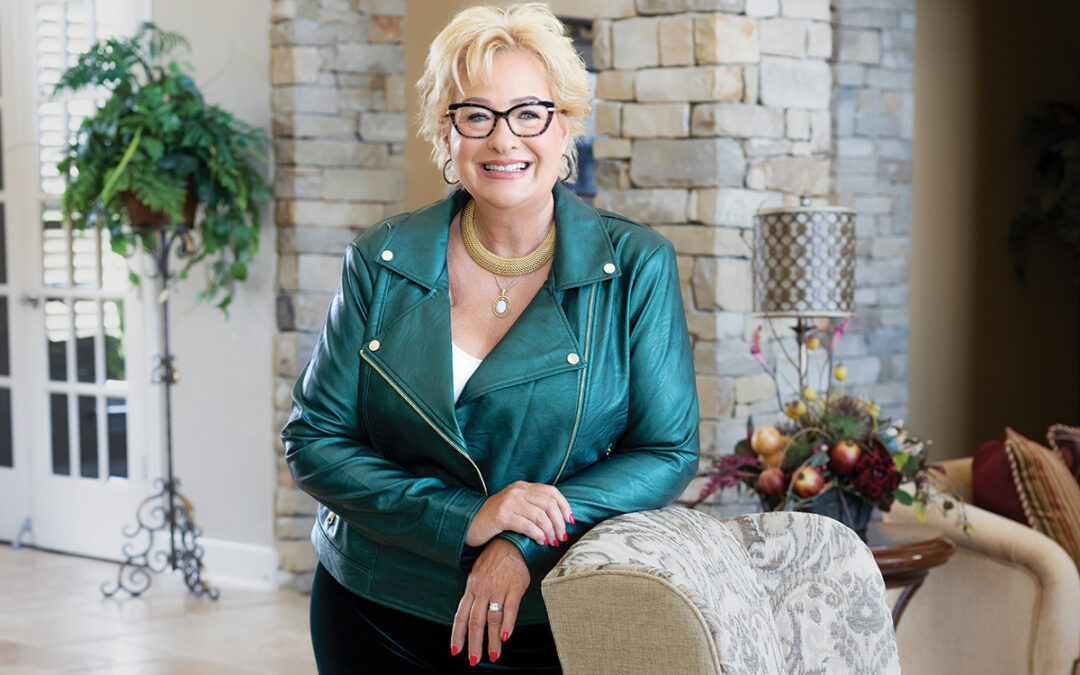Jelynne LeBlanc-Burley helps CPS Energy meet 21st century goals
While most of us were relaxing during the last Memorial Day weekend, Jelynne LeBlanc-Burley spent a great deal of time cooped up inside the CPS Energy Emergency Management Center, following weather reports and guiding the company’s response to potentially dangerous developments caused by the storms. Emergencies are part of her job. LeBlanc-Burley is the executive vice president and chief delivery officer for CPS Energy, San Antonio’s municipally owned utility that supplies electricity and natural gas to a total of 1.1 million customers in the greater San Antonio area.
“I understand what happens to property and to people in these situations. Over the years I have seen a lot of devastation, and I have a keen sense of the potential for danger. It can quickly become catastrophic, so you have to be on it,” she says. “I wanted to make sure that we had the correct information and that that information was disseminated appropriately, and that we had resources deployed to help people affected by outages.”
Since she took the helm of the Energy Delivery and Customer Service sectors, she has been implementing customer-focused policies that utilize both technological and human resources to improve service, help people in need, conserve energy and look to the future needs of both CPS Energy and the public. “Our utility is at a crossroads right now,” explains LeBlanc-Burley. “Our industry is changing, and it all started with this (she holds up her smartphone). Customers today want control, convenience and choice, and we have to be ready.”
These choices may range from the way they pay their bill — in person, by mail, online — to programs that would allow customers to choose how they access solar energy. Those who cannot install rooftop panels, for instance, will be able to get solar-generated energy through a “community solar system” by buying or renting panels on a public system. Another recent service created in response to consumer demand is the installation of public chargers for electric cars; 120 have been installed so far.
And there’s more. LeBlanc-Burley points out that Thomas Edison would be very comfortable seeing our present electrical infrastructure because it has not changed substantially for 100 years. But a major overhaul has begun. CPS Energy and other utilities nationwide are in the process of developing “smart grids” to optimize both the delivery and conservation of energy. To begin with, your meters will be replaced by digital “smart” devices that will directly communicate with a central data center, eliminating the need for meter readers to access customers’ property. While this Grid Optimization Project is supervised by another executive, LeBlanc-Burley is preparing for the post-installation challenges.
Managing a workforce of 1,850 employees (the largest CPS Energy group) is very much part of that. “With all the new devices added to the infrastructure, we need to keep our workers skilled and educated and anticipate the workload ahead of us, not just for the linemen but for engineers and data scientists, too,” she notes. “We will be collecting a lot of data; it’s all about data analytics now.” In addition, her business plan includes things that we as consumers never think about — cable and pole replacements for the overhead transmission grid, call center technological improvements, pipe replacement for gas transmission, substation modernization, etc. She pulls out a little card to give me the exact numbers showing the vastness of the task: 7,744 miles of overhead electrical lines, 4,915 miles of underground lines, 1,508 miles of transmission lines and a gas line system consisting of 5,210 distribution and 89 transmission miles.
Managing and motivating such a large workforce can be a challenge for any executive. LeBlanc-Burley believes that employee engagement is the answer. “We need to explain to employees our vision and strategies, why we are going in the direction we are going. It is also our job to make sure they have the tools to do their job in a safe manner and that we send them home at night the way their families sent them to us in the morning.”
Hard Work and Integrity
 A native of Baton Rouge, La., where she became the first black child to enroll in her elementary school, young Jelynne grew up with a single mother who was a role model for her. “She was an African-American woman lawyer, the first in the East Baton Rouge Parish in the 1960s,” notes the proud daughter. “She never indicated that being a woman was an extra burden. She just did what she needed to do.” It was also Mom who encouraged her to pursue urban studies at Trinity University instead of law, and to stay in San Antonio following the completion of her master’s degree. Though her mother passed away, her picture keeps vigil on the daughter’s desk, joined by photos of LeBlanc-Burley’s daughters and her beloved grandmother.
A native of Baton Rouge, La., where she became the first black child to enroll in her elementary school, young Jelynne grew up with a single mother who was a role model for her. “She was an African-American woman lawyer, the first in the East Baton Rouge Parish in the 1960s,” notes the proud daughter. “She never indicated that being a woman was an extra burden. She just did what she needed to do.” It was also Mom who encouraged her to pursue urban studies at Trinity University instead of law, and to stay in San Antonio following the completion of her master’s degree. Though her mother passed away, her picture keeps vigil on the daughter’s desk, joined by photos of LeBlanc-Burley’s daughters and her beloved grandmother.
An internship with the City of San Antonio led to a job offer which segued into an illustrious 24-year career at City Hall, ending with the position of deputy city manager. During her long tenure, she’s been involved in many projects and city departments, from housing and neighborhood services to public works, international affairs and information services. Her stepdaughter, Crystal, and her daughter, Juliet, often accompanied her to public meetings, and each has memories of debates surrounding certain projects, like the Convention Center or the Alamodome construction. They also have memories of confusing newspaper articles mentioning their mother and of people always claiming their mom’s attention. Now a 25-year-old professional cook, Juliet recalls how she used to stop eager citizens from interfering with the family’s grocery shopping: “I would tell them, ‘You can call her on Monday. Now we are just buying eggs.’” The startled person would back away.
“It was a very fulfilling career,” says LeBlanc-Burley of her years with the city. “I still run into neighborhood activists who remember the time we worked together on a drainage problem or housing issue. One regret I have is that I won’t be able to give back to my hometown of Baton Rouge anything like what I have given to San Antonio. San Antonio has embraced me, but San Antonians have a way of letting you know that you are not from here. Still I like it here. It’s a much more diverse city than Baton Rouge.”
Asked to compare working at CPS Energy versus working for the city, she doesn’t hesitate: “Both entities are citizen-focused, but the contrast is in the nature of the business. The city (offices) can close sometimes. There’s not one aspect of this business that can ever close. That’s a huge difference.” To keep up with the demands of the job, this executive wakes up very early, hits the gym at 5 a.m. and by 6 is already back at her computer, sending messages to her direct reports and preparing for the day. Basically the job requires her “to stay on all the time.” She monitors her phone constantly to stay informed about any employee incidents that may occur in the course of a day. The work they do is often dangerous, and the concern is not misplaced.
This attitude of caring is also evident in the Community Engagement programs that LeBlanc-Burley initiated to educate and help CPS Energy customers as well as in her personal involvement with a number of nonprofits in town. “Service is the price you pay for the space you occupy,” she says matter-of-factly. Her civic affiliations include board and leadership positions with San Antonio for Growth on the Eastside, known as SAGE; Christus Santa Rosa Health System; Girl Scouts of Southwest Texas; San Antonio Hispanic Chamber; Alamo Colleges Advisory Council; United Way and others.
Being a black woman in the top echelons of corporate leadership, Jelynne is frequently asked to speak to young audiences about succeeding in life and work. Everything is possible, she tells them, but it’s hard work. You have to be disciplined, dependable, prepared, and you cannot compromise your integrity. It also requires patience, tolerance for different personalities and ideas, and the ability to stay pleasant no matter how you feel inside. Her own career embodies these principles. While she has huge responsibilities that affect the lives of more than 1 million San Antonians, the soul-nourishing rewards are big, too. “What I like best about my work are the people, the people I work with and the people I serve. It’s gratifying to me to look at the town and think how all those poles and wires mean so much to my community,” she says.









0 Comments